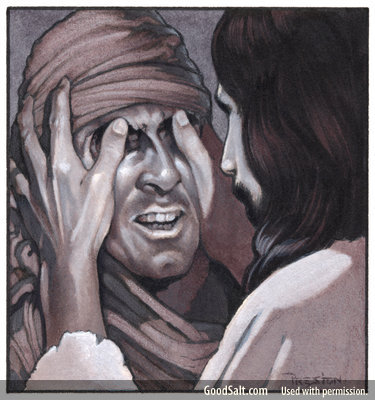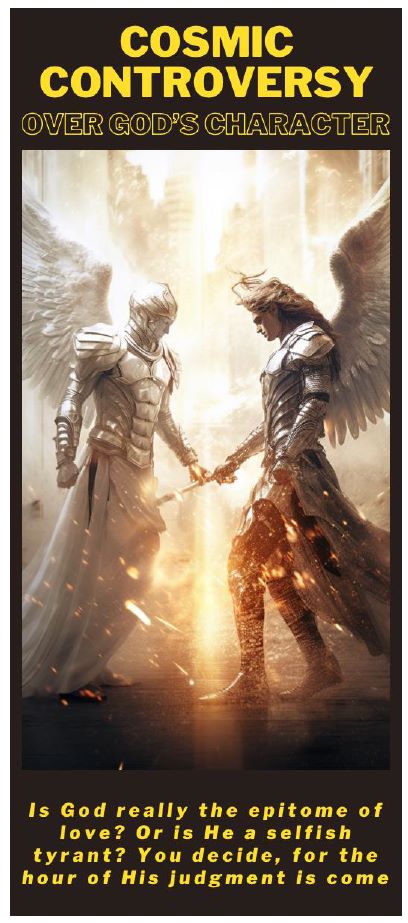(Exodus 4:11; John 9:2-4) Does God Make People Mute, Deaf, and Blind etc.?
“So the LORD said to him [Moses], ‘Who has made man’s mouth? Or who makes the mute, the deaf, the seeing, or the blind? Have not I, the LORD?’” (Exodus 4:11; New King James Version)
“Now as Jesus passed by, He saw a man who was blind from birth. And His disciples asked Him, saying, ‘Rabbi, who sinned, this man or his parents, that he was born blind?’ Jesus answered, ‘Neither this man nor his parents sinned, but that the works of God should be revealed in him. I must work the works of Him who sent Me while it is day; the night is coming when no one can work. As long as I am in the world, I am the light of the world.” (John 9:2-4; New King James Version)
Exodus 4:11
 A superficial reading of this can and does cause people to believe God is saying that He creates people mute, deaf and blind. The answer is given that since God is love, He intentionally makes certain people this way for a special purpose. Here’s how the English Standard Version translates it:
A superficial reading of this can and does cause people to believe God is saying that He creates people mute, deaf and blind. The answer is given that since God is love, He intentionally makes certain people this way for a special purpose. Here’s how the English Standard Version translates it:
“Then the LORD said to him, ‘Who has made man’s mouth? Who makes him mute, or deaf, or seeing, or blind? Is it not I, the LORD?’”
And here’s the New International Version:
“The LORD said to him, ‘Who gave human beings their mouths? Who makes them deaf or mute? Who gives them sight or makes them blind? Is it not I, the LORD?’”
Can you see a difference between these two translations from the New King James above? The New King James (and others including the King James) simply says God makes the mute, the deaf and the blind. These other two translations (and others like them) say that God makes them mute, deaf and blind. The truth is, God does make the people who are mute, deaf and blind, but He does not make them mute, deaf and blind. Do you see the difference?
Say you bought a brand new iPhone from the Apple store. When you get home you open the box and notice that the screen is cracked. Would you drive back to the Apple store and accuse them of intentionally making a phone with a cracked screen? Of course not. Although the Apple manufacturers made the phone, they did not make it with a cracked screen. Something happened to the phone while in transit to your local store.
The same thing is happening to God’s creation. While God is a perfect Creator, the presence of sin in this world has a negative effect upon His design. For example, after Adam sinned God said:
“… the ground is cursed because of you. All your life you will struggle to scratch a living from it. It will grow thorns and thistles for you, though you will eat of its grains.” (Genesis 3:17, 18; New Living Translation)
Before sin, God had created the ground, but after sin it became cursed and would not produce the perfect vegetation as it did before sin. God created the ground that later became cursed, but He did not create the ground cursed.
In the parable of the wheat and the tares (Matthew 13:24-30), Jesus talks about “a man who sowed good seed in his field; but while men slept, his enemy came and sowed tares among the wheat and went his way.” After seeing all the tares growing in the field, the man’s servant, knowing that his master only sowed good seed, asked where the tares came from. The master answered, “An enemy has done this.” It is the enemy (Satan) who has polluted God’s perfect design for His creation by introducing the destructive effects of sin.
“The earth mourns and fades away, the world languishes and fades away; the haughty people of the earth languish. The earth is also defiled under its inhabitants, Because they have transgressed the laws, Changed the ordinance, Broken the everlasting covenant. Therefore the curse has devoured the earth, and those who dwell in it are desolate. Therefore the inhabitants of the earth are burned, and few men are left.” (Isaiah 24:4-6)
But what about what God said to Eve:
 “I will sharpen the pain of your pregnancy, and in pain you will give birth. And you will desire to control your husband, but he will rule over you.” (Genesis 3:16; New Living Translation)
“I will sharpen the pain of your pregnancy, and in pain you will give birth. And you will desire to control your husband, but he will rule over you.” (Genesis 3:16; New Living Translation)
Here it sounds like God is directly punishing Eve for sinning, causing her to have severe pain while in labor. However, this must be understood in the permissive sense and not in the causative sense. As you have learned (or will learn) by reading the articles on this website, throughout Scripture we read strange statements such as God hardening hearts (Exodus 7:3), sending evil spirits (Judges 9:23; 1 Samuel 16:14), destroying lives (Genesis 6:7; 1 Corinthians 3:17) and sending strong delusions (2 Thessalonians 2:11). These are all idiomatic Hebrew expressions where God is said to “do” that which He reluctantly “permits” to be done. God permits severe labor pains but He does not cause it. Likewise, God permits various handicaps and disorders that are contrary to His ultimate design such as muteness, deafness, addictions, growth disorders, extreme phobias, homosexual propensities, learning disabilities, mental illness and blindness (etc.) – but He does not create them.
“Every good gift and every perfect gift is from above, and comes down from the Father of lights, with whom there is no variation or shadow of turning.” (James 1:17)
Remember this principle when you come across such statements in Scripture, which do speak of calamities as a direct effect of one’s sin, such as:
“The Lord will strike you with the boils of Egypt, with tumors, with the scab, and with the itch, from which you cannot be healed. The Lord will strike you with madness and blindness and confusion of heart. And you shall grope at noonday, as a blind man gropes in darkness; you shall not prosper in your ways; you shall be only oppressed and plundered continually, and no one shall save you.” (Deuteronomy 28:27-29)
Does God really cause diseases and handicaps, or does He reluctantly permit them because He could not prevent them due to their breach and they reaped what they themselves had sown?
“Because they hated knowledge and did not choose the fear of the LORD; they did not want My advice, and they rejected all My correction. They will eat the fruit of their way, and they will be filled with their own devices.” (Proverbs 1:29-31)
You see, God NEVER interferes with one’s free-choice to reject His protection. Through God’s perfect wisdom, He must reluctantly permit the enemy to carry out his destructive work. He must permit sin to magnify so we see it, acknowledge it, confess it, and be cleansed of it.
“For I consider that the sufferings of this present time are not worthy to be compared with the glory which shall be revealed in us. For the earnest expectation of the creation eagerly waits for the revealing of the sons of God. For the creation was subjected to futility, not willingly, but because of Him who subjected it in hope; because the creation itself also will be delivered from the bondage of corruption into the glorious liberty of the children of God. For we know that the whole creation groans and labors with birth pangs together until now.” (Romans 8:18-23)
Going back to our discussion of Exodus 4:11, Ray Foucher writes:
“God takes responsibility for making people but not for making them blind etc – that is the work of the enemy.
The context of this passage [Exodus 4:11] is important to consider. Moses was trying to be excused from God’s assignment to him to request that Pharaoh release the Israelites from slavery. Moses reply was:
“… O my Lord, I am not eloquent, neither heretofore, nor since thou hast spoken unto thy servant: but I am slow of speech, and of a slow tongue.” (Exo 4:10)
In Exodus 4:11 God was, of course, countering Moses excuse saying He has made all people and is able to overcome such defects and then proposes how He would deal with the defect Moses was claiming as an excuse – and Moses was not even mute. His question to Moses could be understood as a rhetorical question. The answer being that if God could make people in the first place he could certainly fix any defects and enable them to function fully.” (Ray Foucher, characterofgod.org)
John 9:2-4
 “Now as Jesus passed by, He saw a man who was blind from birth. And His disciples asked Him, saying, ‘Rabbi, who sinned, this man or his parents, that he was born blind?’ Jesus answered, ‘Neither this man nor his parents sinned, but that the works of God should be revealed in him. I must work the works of Him who sent Me while it is day; the night is coming when no one can work. As long as I am in the world, I am the light of the world.” (John 9:2-4; New King James Version)
“Now as Jesus passed by, He saw a man who was blind from birth. And His disciples asked Him, saying, ‘Rabbi, who sinned, this man or his parents, that he was born blind?’ Jesus answered, ‘Neither this man nor his parents sinned, but that the works of God should be revealed in him. I must work the works of Him who sent Me while it is day; the night is coming when no one can work. As long as I am in the world, I am the light of the world.” (John 9:2-4; New King James Version)
First, notice that it’s not the man’s sin nor his parents which caused him to be blind. This means, his blindness was not a direct punishment from God due to his (or his parent’s) practice of sin. But if the man was born blind, why would the disciples ask if his blindness was due to any sin he had committed? Well, although we are incapable of knowing the disciples’ thoughts here, they could have believed in the popular doctrine of the day called transmigration of souls. Adam Clarke explains:
“The doctrine of the transmigration of souls appears to have been an article in the creed of the Pharisees, and it was pretty general both among the Greeks and the Asiatics. The Pythagoreans believed the souls of men were sent into other bodies for the punishment of some sin which they had committed in a pre-existent state. This seems to have been the foundation of the disciples question to our Lord. Did this man sin in a pre-existent state, that he is punished in this body with blindness? Or, did his parents commit some sin, for which they are thus plagued in their offspring?” (Clarke’s Commentary on the Whole Bible, John 9:2)
Many eastern religions have a similar idea as the transmigration of souls, or a variation of reicarnation, where some trouble in this life is believed to be caused by an event in a past life or an event that happened to the soul in the spirit world before it was born as a human.
Either way, Jesus rejected both claims (that the man's blindness was caused by his parents or himself). In the first part of this article, we learned that it is the presence of sin in general that effects the earth and its inhabitants. Sin is a pollutant (a virus) that acts like chemical and biological warfare from the enemy.
Here in the New King James (and others) it reads as if God intentionally created this man blind in order that His works would be revealed when Jesus comes to heal him (which He does in verse 6). Why is he blind? So “that the works of God should be revealed in him.”
The problem lies in the period after the word “him.” Here in the Greek there is no rule as to what punctuation is inserted when translating to English and most translators insert a period after the word “him”. However, this actually stops Jesus’ thought process too early, making it sound like the man’s blindness was the works of God in him. The sentence should instead contain a comma (or a semi colon) which would allow the flow of what Jesus was saying to continue. Take a look:
 “Jesus answered, ‘Neither this man nor his parents sinned, but that the works of God should be revealed in him, I must work the works of Him who sent Me while it is day …’”
“Jesus answered, ‘Neither this man nor his parents sinned, but that the works of God should be revealed in him, I must work the works of Him who sent Me while it is day …’”
Here’s how it reads in the Literal Standard Version:
“Jesus answered, ‘Neither this one sinned nor his parents, but that the works of God may be revealed in him; it is necessary for Me to be working the works of Him who sent Me while it is day …’” (John 9:3, 4; Literal Standard Version)
In other words, “in order for the works of God to be revealed in him, it is necessary for Me to be working the works of Him who sent Me.” This was Jesus’ mission – to do the works of His Father. Jesus said, “Do you not believe that I am in the Father, and the Father in Me? The words that I speak to you I do not speak on My own authority; but the Father who dwells in Me does the works” (John 14:10). And Jesus, the Messiah, was sent to heal (Luke 4:18,19).
In some translations of John 9:4 it says “we” instead of “I” – “While it is daytime, we must do the works of Him who sent Me” (Berean Standard Bible). It all depends on which Greek manuscript is being used for that particular translation. The word “we” doesn’t necessarily mean it’s wrong. At the end of verse 4 Jesus says, “As long as I am in the world, I am the light of the world.” In Matthew 5:14 Jesus says, “You [His followers] are the light of the world.” Then in John 14:12 He says, “Most assuredly, I say to you, he who believes in Me, the works that I do he will do also; and greater works than these he will do, because I go to My Father.” So, we, through the indwelling presence of Christ’s Spirit, will carry on the works of God. Even the disciples healed people (Acts 3:1-10).
Again, it’s not that God deliberately created the man blind, but that He permitted the man to remain blind until Jesus came to heal him, demonstrating the works of God who desires to heal and restore and reverse the curse from the enemy who comes to “steal, kill and destroy” (John 10:10). Not all of us will perform physical healings, but as the enemy cripples and maims God’s creation (both physically and mentally), the works of God are revealed as “the blind receive their sight, and the lame walk, the lepers are cleansed, and the deaf hear, the dead are raised up, and the poor have the gospel preached to them” (Matthew 11:5).
Ultimately what Jesus wants to do is to correct our wrong ideas about God that we might be reconciled to Him and gain eternal life — for that is the only true and final way to overcome the pain and suffering of this sinful world, and all the healing is to help us believe that.
*****
Nepali Translation of this article: (प्रस्थान ४:११; यूहन्ना ९:२-४) के परमेश्वरले मानिसहरूलाई aगुङ्गा, बहिरा र अन्धा आदि बनाउनुहुन्छ?



/Did_God_Kill_Jesus_(cover).jpg)


